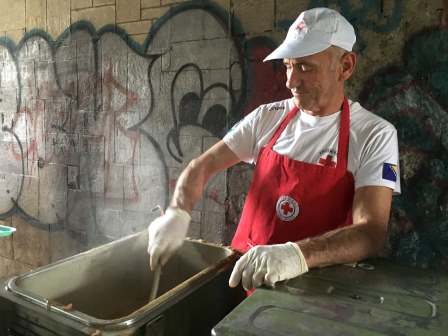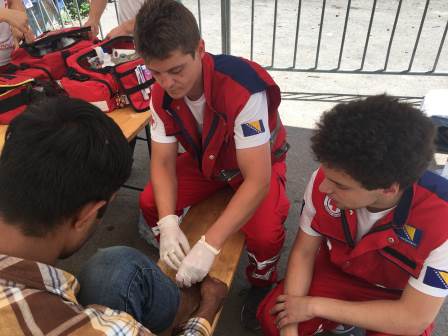I recently spent two weeks in north-western Bosnia in a town called Bihac, very near the Croatian border. More than 8,000 people have arrived in Bosnia and Herzegovina since the beginning of the year– roughly eight times the total number of people in 2017. Most of them come from Pakistan, Syria, Afghanistan, Iran, and Iraq.
People staying there tell horrific stories such as their entire families being killed in car bombs, and seeing family members shot in front of them, which is why they say they’ve decided to try to make the long and sometimes dangerous journey into Europe.
People tell stories of being in the forest along borders for many days without food or water, and without access to proper healthcare.

Red Cross volunteer serves warm meal to migrants at a camp near the Croatia border. Nicole Robicheau, IFRC.
Red Cross volunteers are there supporting a makeshift camp that’s been set up in an abandoned building to provide services. They’re providing three meals a day, clothes, and hygiene items as well as first aid. Conditions remain difficult and the humanitarian needs there are immense. Most people move towards this part of the country trying to enter the European Union through Croatia. When I was there, roughly 1,000 people were staying there, but the number fluctuates daily as people leave to attempt to cross, and more people arrive daily. Many people arriving there have left their homes several years ago and have very few things apart from the clothes on their backs.
 Red Cross volunteers provide first aid to a man with an injured foot in a camp for migrants close to the Croatia border. Most people come with injuries sustained by trying to cross the border. Nicole Robicheau, IFRC.
Red Cross volunteers provide first aid to a man with an injured foot in a camp for migrants close to the Croatia border. Most people come with injuries sustained by trying to cross the border. Nicole Robicheau, IFRC.
When I first arrived, many of the migrants were single men traveling alone, but towards the end of my time there, more and more families began arriving. When I left about ten per cent of the population at the camp were children.
On the last day I was at the informal camp, I spent the morning with the Red Cross team providing first aid services. Each morning people line-up and wait their turn.
There were a few children waiting, and I began talking to the first one in line, who couldn’t have been more than ten.
I asked her what was wrong, and she pointed to her foot. When I looked down I saw a lot of scabs all over her feet.
What happened, I asked her.
“It’s from game”.
If you were in Canada you would assume that this is from some kind of playing around, maybe soccer or some other sport.
But not here.
Game refers to attempting to cross the border, it’s what smugglers call it, who migrants pay thousands of dollars to help them. So this little girl got those injuries trying to cross through the forest into Croatia, with her parents, looking for a better life than the one they came from.
No child should have to live like this.
The International Federation of Red Cross and Red Crescent societies recently released
a report identifying a number of factors that prevent vulnerable migrants from accessing the support they need. Such factors range from the fear of harassment, arrest or deportation, to the less obvious, which can include prohibitive costs, cultural and linguistic barriers, and a lack of information about their rights.
The Red Cross is working wherever migrants are, trying to ensure their most basic needs are met, and ensuring they’re being treated with dignity and respect.